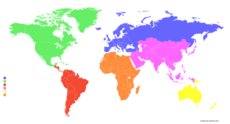European Handball Federation
The European Handball Federation (EHF) is the umbrella organisation for European handball. Founded on 17 November 1991, it is made of 50 member federations and two associated federations (England and Scotland), and is headquartered in Vienna, Austria. The current EHF President is Michael Wiederer, who was elected on 17 November 2016 and will serve until 2020. The federation celebrated its 20th anniversary on 17 November 2011 at a gala event under the slogan 'HeartBeat Handball'.[1]
| European Handball Federation EHF | |
|---|---|
 | |
| Sport | Handball |
| Other Sports |
|
| Official website | www |
| History | |
| Year of formation | 17 November 1991 at |
| Demographics | |
| Membership size | 52 Members (50 full, 2 associate) |
| International federation | International Handball Federation (IHF) |
| IHF member since | 1992 |
| Governance | |
| President | Michael Wiederer |
| Vice-President | |
| Secretariat | |
| Address |
|
| Country | Austria |
| Secretary General | Martin Hausleitner |
| Official Language(s) | English |
| Number of staff | 69 |
| Finance | |
| Sponsors | Infront Sports & Media Salming Sports AB Select Sport Gerflor Group Sport Transfer SPORTADD/INTENSEGRIP Rotowash QUICK PLAY Trial Axitour Communication Systems |
| Regions | |
History of the EHF
EHF was founded on 17 November 1991 in Berlin, Germany, although the first EHF Congress convened on 5 June 1992 and assigned EHF's headquarters to Vienna, Austria from 1 September that year. In 2012 the EHF Office celebrated 20 years since it first opened its doors.[2] In the subsequent years, the number of member countries has expanded from the initial 29 to its current number of 50, after Kosovo was granted full membership at the EHF Congress in Dublin, Ireland in September 2014.[3] The EHF represents its members in the development of the sport both in terms of grassroots talent, as well as commercial growth. EHF-organised events such as the Men’s and Women’s European Handball Championships and the EHF Champions League represent major revenue contributors, while initiatives such as beach handball and handball at school expand the attraction of the sport.
Presidents
| S. No. | Name | Tenure |
|---|---|---|
| 1. | Staffan Holmqvist | 17 November 1991 – 18 December 2004 |
| 2. | Tor Lian | 18 December 2004 – 22 June 2012 |
| 3. | Jean Brihault | 22 June 2012 – 17 November 2016 |
| 4. | Michael Wiederer | 17 November 2016 – present |
Secretary Generals
| S. No. | Name | Tenure | |
|---|---|---|---|
| 1. | Michael Wiederer | 1 September 1992 – 17 November 2016 | |
Post vacant from 17 November 2016 to 1 August 2017 | |||
| 2. | Martin Hausleitner | 1 August 2017 – present | |
Executive Committee
| Designation | Name |
|---|---|
| President | Michael Wiederer |
| Vice-President | Predrag Bošković |
| Treasurer | Henrik La Cour Laursen |
| Executive Members | Stefan Lövgren |
| Gabriella Horváth | |
| Anrijs Brencans | |
| Chairman of Competitions Commission | Božidar Đurković |
| Chairman of Methods Commission | Jerzy Eliasz |
| Chairman of Beach Handball Commission | Ole R. Jørstad |
| Chairman of Professional Handball Board | Xavier O'Callaghan |
| Chairperson of Women's Handball Board | Narcisa Lecușanu |
Commissions
| Commission | Chairman/Chairwomen |
|---|---|
| EF Beach Handball Commission | Ole R. Jørstad |
| EHF Competitions Commission | Božidar Đurković |
| EHF Court of Appeal | Markus Plazer |
| EHF Court of Arbitration Council | Francesco Purromuto |
| EHF Court of Handball | Panos Antoniou |
| EHF Methods Commission | Jerzy Eliasz |
| EHF Nations Board | Morten Stig Christensen |
| EHF Professional Handball Board | Xavier O'Callaghan |
| EHF Technical Refereeing Committee | Dragan Nachevski |
| EHF Women's Handball Board | Narcisa Lecușanu |
Competitions
- European championships
- European Men's Handball Championship
- European Women's Handball Championship
- European Men's U-20 Handball Championship
- European Women's U-19 Handball Championship
- European Men's U-18 Handball Championship
- European Women's U-17 Handball Championship
- European Open Handball Championship
- European Men's Beach Handball Championship
- European Women's Beach Handball Championship
- EHF Challenge Trophy
- EHF Nations' Cup – Defunct
- Multi-sports events
- Men's club competitions
- EHF Champions League
- EHF European League (former EHF Cup)
- EHF Cup Winners' Cup (merged with the EHF Cup from the 2012/13 season[4])
- EHF European Cup (former EHF Challenge Cup and City Cup)
- European Beach Handball Tour
- EHF Beach Handball Champions Cup
- Women's club competitions
- Women's EHF Champions League
- Women's EHF European League (former Women's EHF Cup)
- Women's EHF Cup Winners' Cup (merged with the Women's EHF Cup from the 2016/17 season)
- Women's EHF European Cup (former Women's EHF Challenge Cup and City Cup)
- European Beach Handball Tour
- EHF Beach Handball Champions Cup
Current title holders
Handball
| Competitions | Current champion | Title |
|---|---|---|
| European Men's Handball Championship | 2nd | |
| European Women's Handball Championship | 1st | |
| European Men's Junior Handball Championship | 1st | |
| European Women's Junior Handball Championship | 1st | |
| European Men's Youth Handball Championship | 1st | |
| European Women's Youth Handball Championship | 1st | |
| European Men's Open Handball Championship | 1st | |
| European Women's Open Handball Championship | 1st | |
| EHF Women's Challenge Trophy | 3rd | |
| European Youth Olympic Festival (Men's Event) | 1st | |
| European Youth Olympic Festival (Women's Event) | 1st |
Beach handball
| Competitions | Current champion | Title |
|---|---|---|
| European Men's Beach Handball Championship | 1st | |
| European Women's Beach Handball Championship | 1st | |
| European Men's Youth Beach Handball Championship | ||
| European Women's Youth Beach Handball Championship |
Wheelchair handball
| Competitions | Current champion | Title |
|---|---|---|
| European Wheelchair Handball Nations’ Tournament | 1st |
Club
| Competitions | Current champion | Title |
|---|---|---|
| EHF Champions League | 2nd | |
| EHF Cup | 4th | |
| EHF Challenge Cup | 1st | |
| Women's EHF Champions League | 5th | |
| Women's EHF Cup | 1st | |
| Women's EHF Challenge Cup | 2nd |
Combined medal table
This table shows all medals by country, in all European Handball Federation (team handball) national competitions. This table does not include medals won at club level and Beach Handball.
| Rank | Nation | Gold | Silver | Bronze | Total |
|---|---|---|---|---|---|
| 1 | 24 | 13 | 23 | 60 | |
| 2 | 15 | 16 | 7 | 38 | |
| 3 | 12 | 11 | 8 | 31 | |
| 4 | 12 | 7 | 8 | 27 | |
| 5 | 11 | 2 | 11 | 24 | |
| 6 | 10 | 7 | 7 | 24 | |
| 7 | 7 | 13 | 9 | 29 | |
| 8 | 4 | 5 | 10 | 19 | |
| 9 | 3 | 6 | 3 | 12 | |
| 10 | 3 | 4 | 3 | 10 | |
| 11 | 2 | 5 | 6 | 13 | |
| 12 | 2 | 3 | 5 | 10 | |
| 13 | 2 | 1 | 2 | 5 | |
| 14 | 1 | 3 | 1 | 5 | |
| 15 | 1 | 2 | 0 | 3 | |
| 16 | 1 | 0 | 0 | 1 | |
| 17 | 0 | 3 | 1 | 4 | |
| 18 | 0 | 2 | 2 | 4 | |
| 19 | 0 | 2 | 1 | 3 | |
| 20 | 0 | 1 | 1 | 2 | |
| 21 | 0 | 1 | 0 | 1 | |
| 22 | 0 | 0 | 1 | 1 | |
| Totals (22 nations) | 110 | 107 | 109 | 326 | |
- The data is accurate as of 19 August 2018
Affiliated Members

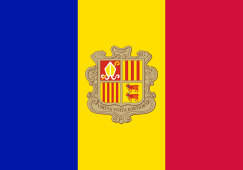




.svg.png)







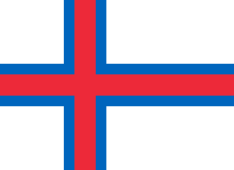











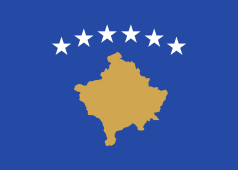

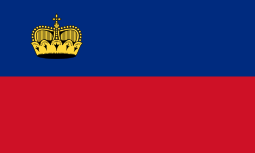



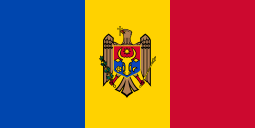



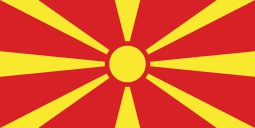













Associated federations
EHF European Championships
The European Men's Handball Championship and European Women's Handball Championship are the flagship national team events of the European Handball Federation and rank amongst the leading indoor sports events on the international sports market. First played in 1994, the EHF EUROs have taken place in host nations across the continent on a biennial basis, with the men’s event held in January and the women’s in December.
The Men’s EHF EURO 2012, held in Serbia, attracted a cumulative global TV audience of 1.47 billion, and was transmitted by 75 broadcasters in more than 200 territories. A record 302,688 spectators also followed the event live in five venues across the countries.
The Men's EHF EURO 2014 in Denmark has set a new attendance record with 316,000 spectators.
The Women’s EHF EURO 2014 in Hungary and Croatia achieved a cumulative audience of 723 million, which is the highest ever result for the championship. The result marks not only a 90 per cent increase on the 2012 edition (380 million), but also significantly tops the previous record set in 2006 (461 million). In terms of broadcast hours, the results were equally remarkable. With 1,919 broadcast hours, the tournament further confirmed its upward trend through an impressive 65 per cent climb of 758 hours compared to 2012. Overall, the tournament was aired in 145 countries.
EHF Champions League

The EHF Champions League was launched in the 1993/94 season for both men's and women's teams. The competition has developed considerably over the years, with the introduction of a distinctive blue lagoon and black floor in the 2007/08 season, the creation of an 'EHF Champions League' ball as well as changes to the format of the competition, which saw the introduction of a new 'Last 16' and the VELUX EHF FINAL4 in the 2009/10 season. From the start of the 2011/12 season, the VELUX Group added their name to the men's competition as title sponsor, and the competition became the VELUX EHF Champions League. The 20th jubilee season (2012/13) saw the launch of a brand new corporate identity and logo.[5] The women's competition also introduced the final tournament for the first time in the 2013/14 season and added the quarter-final stage in the following edition.
EHF European Cup competitions
Over 250 clubs take part in the EHF European Cup competitions, which include EHF Cup, Cup Winners' Cup and Challenge Cup. The 2012/13 season saw a change to the men's European Cup competitions with the amalgamation of the EHF Cup and the Cup Winners' Cup to become simply the 'EHF Cup'. The change was introduced in order to create a three-tier competition system with the VELUX EHF Champions League at the top, followed by the EHF Cup and then the Challenge Cup.[6] The same merging is planned for the 2016/17 season in the women's competitions. The EHF administers over 730 European club matches each year, which take place in all corners of the continent.
Beach handball
Beach handball originated on the beaches of Italy in the 1990s and has established itself as a sport in its own right within the EHF with the organisation of the European Beach Tour and European Championships for men, women and younger age categories. The first European Beach Handball Championships were held in 2000 in Gaeta (Italy) and the most recent was held in Lloret de Mar (Spain) in the summer of 2015. Beach handball is a World Games sport, making its debut in 2009. It will also have its premiere at the 2018 Youth Olympic Games in Buenos Aires.
Development
The EHF has a number of projects and initiatives through which it supports the development of the sport generally and also in its member federations. These include:
- Rinck Convention: named after the EHF Honorary Member, and former chairman of the EHF Methods Commission, Claude Rinck. Its aim is the mutual recognition of standards and certificates in the field of coaches' education in handball in Europe by preserving and safeguarding the regional and national characteristics of coaches' education, in order to facilitate the direct admission to work as a handball coach, in each signatory member federation.
- SMART Projects: short term projects in member federations with specific aims and objectives; includes material support, coaching and technical support.
- Foster Projects: cooperation agreements between federations; usually between top-ranking and emerging nations to support the progress of handball's development.
- Infrastructure Support Programme (ISP): Longer term projects in partnership with member federations; offering part-funding of salaries of staff members, such as development officers to help build capacity in member federations.
EHF Awards
The EHF issues awards to organisations and individuals in recognition of their particular contribution to developing the sport of handball and the EHF.
These awards are:
- EHF Honorary President and Honorary Member
- EHF Special Award
Since 2016, also there are awarded:
References
- "EHF birthday". European Handball Federation. Retrieved 15 November 2011.
- "EHF Office celebrates 20 years in Vienna". European Handball Federation. Retrieved 1 September 2012.
- "Kosovo becomes a full member of the European Handball Federation". European Handball Federation. Retrieved 20 September 2014.
- "New Men's EHF Cup starting"
- "New look for a new season". European Handball Federation. Retrieved 15 June 2012.
- "New Men's EHF Cup starting"
External links
| Wikimedia Commons has media related to European Handball Federation. |
